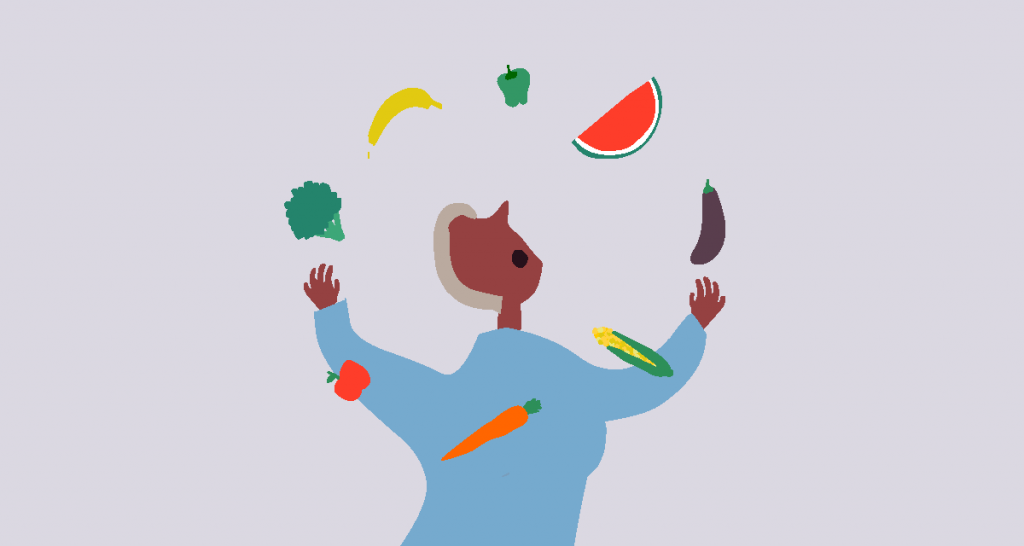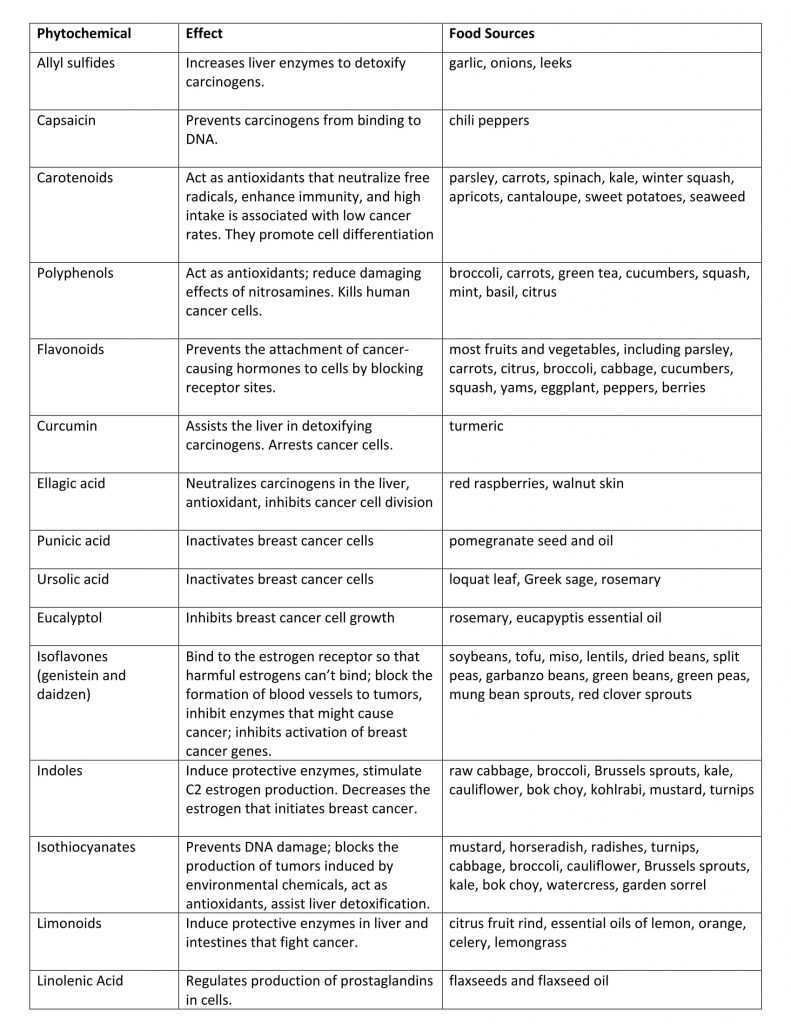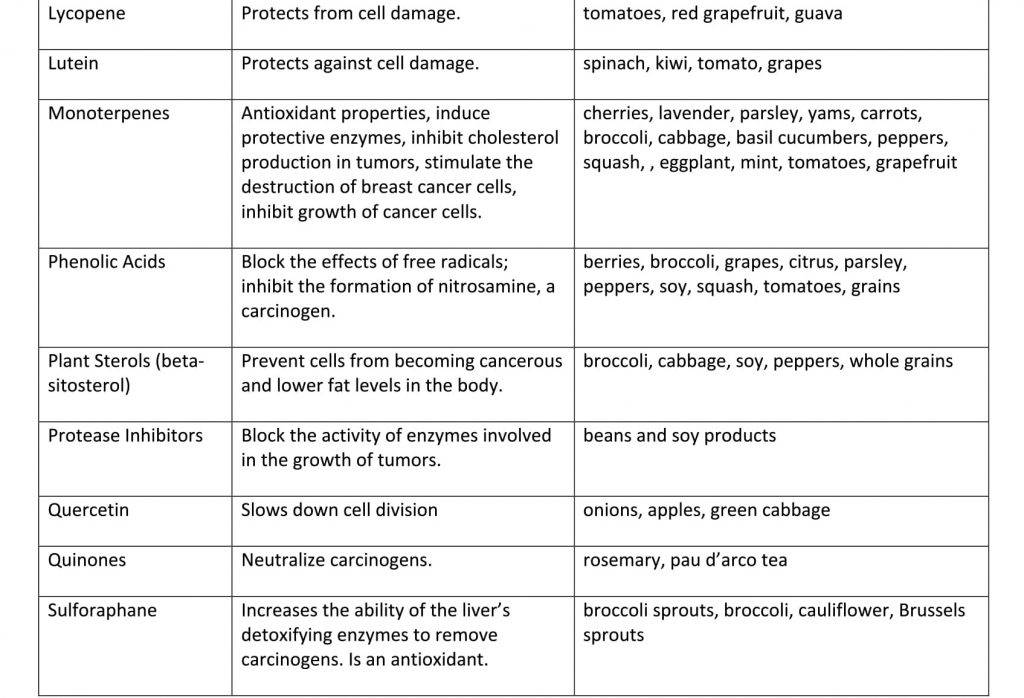Eat 8 servings of fruits and vegetables daily. One serving = 1 cup of salad or 1/2 cup steamed vegetables or 1 whole fruit.
Pass the broccoli, please … Do you know what is in fruits and vegetables that makes them so good for us? Not only do they contain antioxidants like vitamin C and beta carotene, fruits and vegetables have a storehouse of cancer-fighting phytochemicals in them that help to deter inflammation and stop cancer before it starts. Some of these powerful phytochemicals include polyphenols, flavonoids, ursolic acid, indoles, isothiocyanates – it’s a long list. When we eat 8 servings of fruits and vegetables a day we load up on those protective secret agents. Our bodies thank us, our energy improves and we feel lighter.
Fruits and Vegetables are the Body’s Cleansers
Fruits and vegetables support cleansing of the liver and kidneys. Foods such as citrus, cabbage, broccoli, watercress, leafy greens, garlic, onions, leeks and beets support liver detoxification pathways, while other foods, including lemon, celery, spinach, parsley, carrot and watermelon help to gently flush the kidneys. This makes it easier for us to eliminate some of the environmental chemicals that would otherwise build up in our tissues.
Fruits and vegetables contain high amounts of the alkaline minerals, calcium, magnesium, sodium and potassium, which then support us in alkalinizing the fluids in and around our cells. This in turn, makes the lymphatic system more efficient in removing waste. With a more alkaline diet, we experience less stiffness and pain, fewer headaches, and greater flexibility.
Cancer Fighting Phytochemicals Found in Fruits and Vegetables
The following chart outlines protective phytochemicals, what they do, and where they are found.
Fresh Vegetable Juices
The cancer-protective phytochemicals listed in the chart above are found primarily in vegetables and fruits. One of the ways to ensure a high intake of these nutrients is through juicing vegetables, and many cancer therapies, such as Gerson therapy, recommend several glasses a day of vegetable juice. A vegetable base to begin with can be carrot, celery, kale and beet. Start with one tall glass of vegetable juice a day and see how much more energy you have afterwards. Increase this to 1-2 liters a day of vegetable juice for a deeper cleansing.
Consume Brassicas Daily
The Brassica family includes cabbage, kale, broccoli, cauliflower, Brussels sprouts, kohlrabi, turnip, rutabaga, garden sorrel, radish, watercress and collards. All of the brassicas contain the phytochemical indole-3-carbinol, which at 300 mg. daily, doubles C2 hydroxyestrone (a protective estrogen metabolite) and decreases C16 hydroxyestrone (a harmful estrogen metabolite), offering protection against hormonally driven cancers. This amount would be found in 1/3 of a raw cabbage. Indole-3-carbinol decreases the likelihood of metastases in prostate,[i] endometrial and breast cancer[ii] cells.
Brassicas also contain thiols, which improve liver detoxification, and isothiocyanates, which help to prevent DNA damage.[iii]
Broccoli sprouts and watercress are high in sulforaphane, which improves liver detoxification and protects from environmental chemicals. Sulforaphane inhibits growth of various cancer stem cells.[iv]
A word of caution with the raw brassicas – they may interfere with thyroid function and cause a rise in TSH unless a source of iodine, such as sea vegetables is used as well. Check TSH levels every few months to assess thyroid function.
References:
[i] Li Y, Ahmad A, Kong D, et al. Recent progress on nutraceutical research in prostate cancer. Cancer Metastasis Rev. 2013 Dec 28.
[ii] PLoS One 2010 Jul 6;5(7):e11457
[iii] Kim MK, Park JH. Conference on “Multidisciplinary approaches to nutritional problems”. Symposium on “Nutrition and health”. Cruciferous vegetable intake and the risk of human cancer: epidemiological evidence. Proc Nutr Soc. 2009 Feb;68(1):103-10.
[iv] Li Y, Zhang T. Targeting cancer stem cells with sulforaphane, a dietary component from broccoli sprouts. Future Oncol. 2013 Aug;9(8):1097-103.
Take the Breast Health Challenge!
Eat loads of fruits and vegetables or add fresh juices to your diet and take a photo or make a video of you doing it, and post on your Facebook page, Youtube or Instagram with the hashtag #breasthealthchallenge between Oct 1-31.
Sign up to receive daily tips in October: Sign Up
Tell us about your favourite vegetarian dishes in the comments section below. Let’s share what works!
Click here to see all tips
Upcoming Programs
For upcoming Healthy Breast Programs see http://mammalive.net/upcoming-courses/






